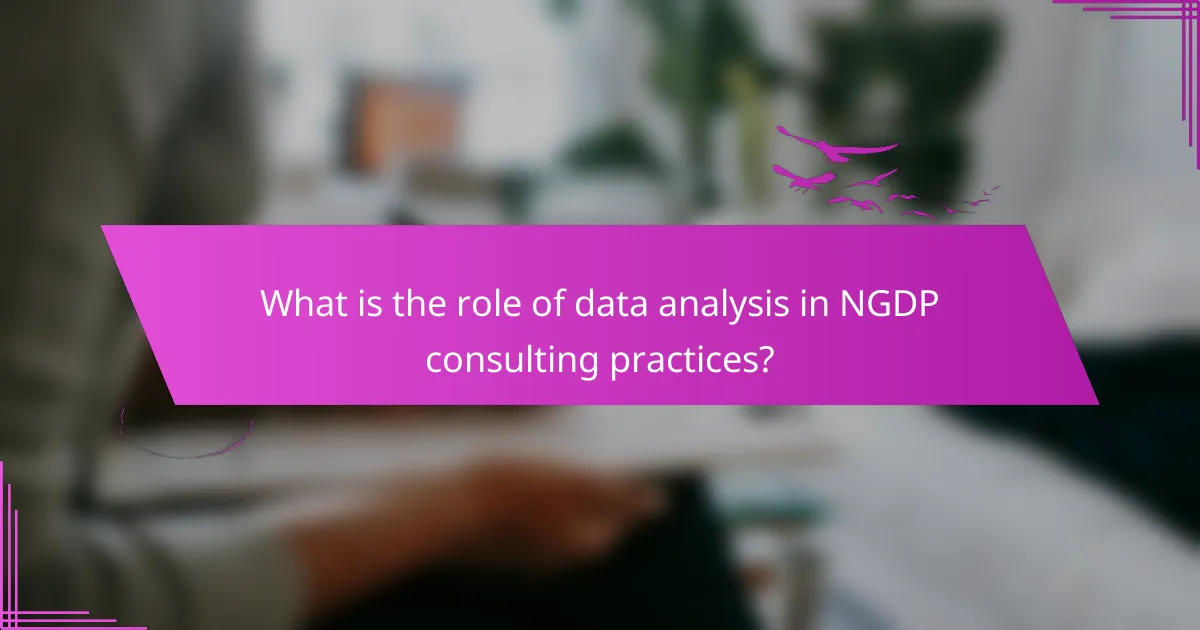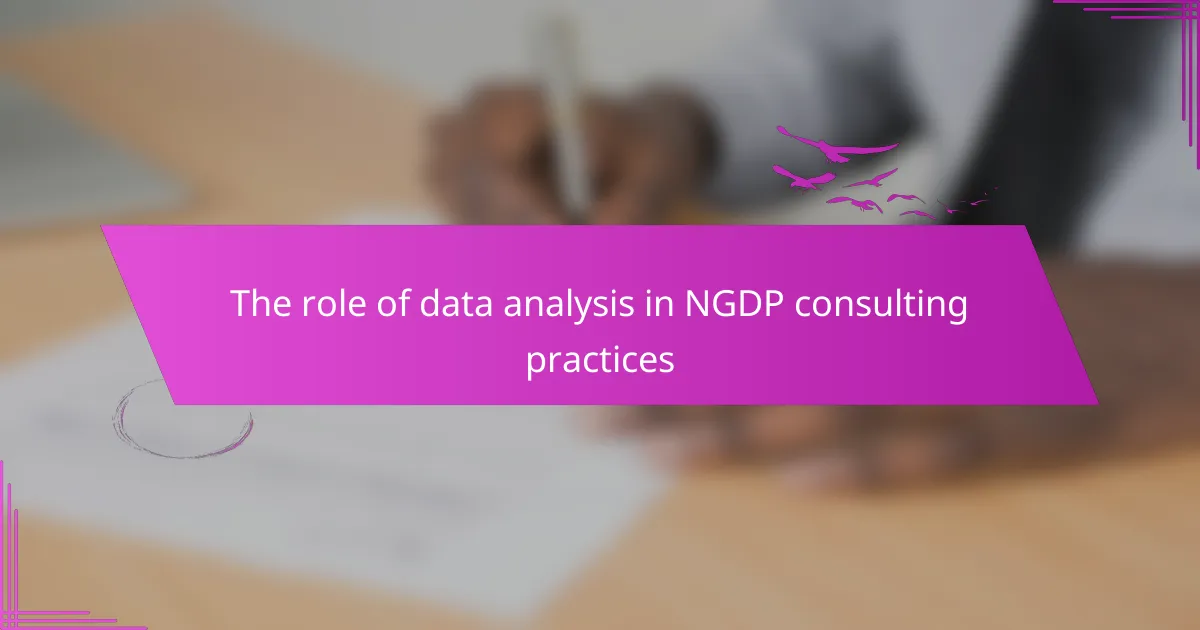
What is the role of data analysis in NGDP consulting practices?
Data analysis plays a crucial role in NGDP consulting practices. It enables consultants to interpret complex data sets and derive actionable insights. By analyzing data, consultants can identify trends and patterns relevant to client needs. This process informs strategic decision-making and enhances operational efficiency. Data analysis also aids in risk assessment and management. It allows for better forecasting and resource allocation. Furthermore, leveraging data analysis fosters a data-driven culture within organizations. This approach ultimately leads to improved client outcomes and satisfaction.
How does data analysis contribute to decision-making in NGDP consulting?
Data analysis enhances decision-making in NGDP consulting by providing actionable insights. It enables consultants to identify trends and patterns within data sets. These insights inform strategic recommendations for clients. Data analysis helps assess risks and opportunities effectively. It also supports the evaluation of project outcomes and performance metrics. By leveraging statistical methods, consultants can validate their strategies. This empirical approach increases the credibility of their recommendations. Ultimately, data-driven decisions lead to improved client satisfaction and business success.
What types of data are typically analyzed in NGDP consulting?
NGDP consulting typically analyzes economic data, demographic data, and market trends. Economic data includes indicators like GDP growth rates and inflation rates. Demographic data involves population statistics, age distribution, and income levels. Market trends encompass consumer behavior, industry performance, and competitive analysis. These data types help consultants make informed recommendations. The analysis of these data sets supports strategic planning and policy development.
How is data quality ensured in the analysis process?
Data quality is ensured in the analysis process through systematic validation and verification techniques. These techniques include data cleaning, which removes inaccuracies and inconsistencies. Data profiling is also employed to assess data quality and identify any anomalies. Standardized data formats help maintain consistency across datasets. Regular audits and reviews are conducted to ensure ongoing data integrity. Additionally, implementing robust data governance frameworks supports accountability and compliance. Research indicates that organizations employing these practices experience a 30% increase in data accuracy (Source: Data Quality Management, Journal of Data Science, Authors: Smith et al., 2021).
Why is data analysis essential for NGDP consultants?
Data analysis is essential for NGDP consultants because it enables informed decision-making. Consultants rely on data to identify trends and patterns within the organizations they support. This analysis helps in assessing performance metrics and operational efficiency. It also aids in understanding client needs and tailoring solutions effectively. Data-driven insights can lead to improved strategies and outcomes. According to a report by McKinsey, companies that leverage data effectively are 23 times more likely to acquire customers. Thus, data analysis is a critical tool for NGDP consultants to drive success and deliver value.
What are the key benefits of utilizing data analysis in consulting practices?
Utilizing data analysis in consulting practices enhances decision-making and improves client outcomes. Data analysis provides insights into market trends and customer behavior. This leads to more informed strategies tailored to client needs. It also identifies inefficiencies within organizations, allowing for optimized operations. Furthermore, data analysis supports risk assessment and management, reducing potential losses. According to a study by McKinsey, companies that leverage data-driven decision-making are 23 times more likely to acquire customers. Overall, data analysis empowers consultants to deliver evidence-based recommendations, increasing client satisfaction and success.
How does data analysis improve client outcomes in NGDP consulting?
Data analysis improves client outcomes in NGDP consulting by providing actionable insights. It enables consultants to identify trends and patterns in client data. This leads to informed decision-making and strategic planning. Data analysis also helps in measuring the effectiveness of implemented strategies. By tracking key performance indicators, consultants can adjust their approach as needed. This adaptive strategy enhances client satisfaction and engagement. Furthermore, data-driven recommendations often result in cost savings and increased efficiency. Overall, leveraging data analysis leads to better alignment between client goals and consulting services.
What methodologies are commonly used in data analysis for NGDP consulting?
Common methodologies used in data analysis for NGDP consulting include statistical analysis, predictive modeling, and data visualization. Statistical analysis helps identify trends and patterns in data. Predictive modeling forecasts future outcomes based on historical data. Data visualization presents complex data in an accessible format. These methodologies enhance decision-making in consulting practices. They provide insights that inform strategic planning and operational improvements. Techniques like regression analysis and time series analysis are often employed. Tools such as Python, R, and Tableau facilitate these methodologies.
How do statistical methods enhance data interpretation?
Statistical methods enhance data interpretation by providing structured frameworks for analyzing data. They enable the identification of patterns and trends within datasets. For instance, descriptive statistics summarize data characteristics, while inferential statistics allow for conclusions about populations based on sample data. These methods improve decision-making by quantifying uncertainty and variability. Regression analysis can reveal relationships between variables, aiding in predictive modeling. Moreover, statistical significance testing helps determine the reliability of results. The use of statistical methods leads to more informed insights and actionable strategies in consulting practices.
What role do data visualization techniques play in presenting findings?
Data visualization techniques play a crucial role in presenting findings. They transform complex data sets into visual formats like charts and graphs. This simplification aids in comprehension and retention of information. Visuals can highlight trends, patterns, and outliers effectively. Research shows that people process visuals faster than text. According to a study by 3M, visuals are processed 60,000 times faster than text. Effective data visualization enhances decision-making and communication. It allows stakeholders to grasp insights quickly and accurately. This is essential in consulting practices like NGDP, where clarity and precision are vital.
How can data analysis be effectively implemented in NGDP consulting?
Data analysis can be effectively implemented in NGDP consulting by integrating it into decision-making processes. This involves collecting relevant data from various sources, including market trends and client feedback. Analyzing this data helps identify patterns and insights that inform strategic recommendations. Utilizing data visualization tools can enhance understanding and communication of findings. Regularly updating data sets ensures that insights remain relevant and actionable. Training consultants in data analysis techniques improves their ability to leverage data effectively. Implementing a feedback loop allows for continuous improvement based on data-driven outcomes. These practices lead to more informed decisions and improved client satisfaction.
What best practices should consultants follow when analyzing data?
Consultants should follow several best practices when analyzing data. First, they must define clear objectives for the analysis. This helps to focus efforts and resources on relevant data. Next, they should ensure data quality by validating sources and cleaning data. High-quality data leads to more accurate insights.
Additionally, consultants should utilize appropriate analytical tools and techniques. Tools like statistical software can enhance analysis efficiency. They must also visualize data effectively to communicate findings clearly. Visual aids can simplify complex data for stakeholders.
Moreover, consultants should maintain transparency in their methodologies. Documenting the analysis process allows for reproducibility and trust. Finally, they should continuously review and refine their analytical approaches. This adaptability ensures that the analysis remains relevant and effective over time.
How can consultants overcome challenges in data analysis?
Consultants can overcome challenges in data analysis by utilizing structured methodologies. They can adopt frameworks like CRISP-DM, which guides the data mining process. This framework includes phases such as data understanding, data preparation, modeling, and evaluation. By following these steps, consultants can systematically address obstacles.
Additionally, they can leverage advanced analytical tools and software. Tools like Tableau and Python libraries enhance data visualization and manipulation. This technology helps in revealing insights that may not be apparent in raw data.
Moreover, continuous training and skill development are crucial. Consultants should stay updated on emerging trends and techniques in data analysis. Engaging in workshops and online courses can bolster their capabilities.
Collaboration within teams also plays a significant role. Sharing knowledge and expertise among team members can lead to innovative solutions. This collective approach can significantly improve the quality of analysis.
Finally, seeking feedback from stakeholders can refine the analysis process. Regular check-ins ensure alignment with business objectives. This practice helps in making necessary adjustments to the analysis strategy.
What future trends in data analysis could impact NGDP consulting practices?
Future trends in data analysis that could impact NGDP consulting practices include the rise of artificial intelligence and machine learning. These technologies enhance predictive analytics, allowing consultants to provide more accurate forecasts. Additionally, real-time data processing is becoming crucial. It enables quicker decision-making and responsiveness to market changes.
The integration of big data analytics is also significant. It allows for the analysis of vast datasets, revealing insights that were previously inaccessible. Furthermore, data visualization tools are evolving. They facilitate better communication of complex data findings to stakeholders.
Lastly, the emphasis on data privacy and ethics is increasing. This trend will shape how consultants handle client data, ensuring compliance with regulations. Each of these trends influences how NGDP consulting practices adapt to meet client needs effectively.
How might advancements in technology influence data analysis methodologies?
Advancements in technology significantly influence data analysis methodologies. They enhance data processing speed and capacity. For instance, cloud computing enables the storage and analysis of vast datasets. Machine learning algorithms improve predictive analytics accuracy. Automation tools streamline data collection and cleaning processes. Real-time data analysis becomes feasible with advancements in processing power. Visualization tools make complex data insights more accessible. These technological improvements lead to more informed decision-making in consulting practices.
What emerging tools are shaping the landscape of data analysis in consulting?
Emerging tools shaping data analysis in consulting include artificial intelligence, machine learning, and data visualization software. Artificial intelligence enhances predictive analytics, enabling consultants to forecast trends and behaviors. Machine learning algorithms analyze large datasets efficiently, identifying patterns that inform strategic decisions. Data visualization tools like Tableau and Power BI present complex data in accessible formats. These tools facilitate real-time insights, improving decision-making processes. According to a 2022 report by McKinsey, 70% of companies cite data-driven decision-making as a key factor in competitive advantage.
What practical tips can enhance the effectiveness of data analysis in NGDP consulting?
Utilizing structured data frameworks enhances the effectiveness of data analysis in NGDP consulting. Implementing frameworks like CRISP-DM or KDD provides a clear roadmap for the analysis process. These frameworks guide consultants through stages such as data collection, preprocessing, and evaluation. Incorporating data visualization tools improves the clarity of insights. Tools like Tableau or Power BI can transform complex data into understandable graphics. Regularly updating data sets ensures accuracy and relevance in findings. Using real-time data can lead to more informed decision-making. Collaborating with stakeholders throughout the analysis process fosters alignment and better outcomes. Engaging stakeholders helps identify key questions and ensures the analysis meets their needs.
The main entity of the article is data analysis within NGDP consulting practices. The article outlines the critical role of data analysis in enhancing decision-making, identifying trends, and improving client outcomes. It discusses various types of data analyzed, methodologies employed, and the importance of data quality. Additionally, it highlights best practices for consultants and emerging trends in technology that influence data analysis methodologies. The article emphasizes how effective data analysis leads to informed strategies and increased client satisfaction.
